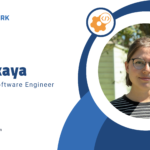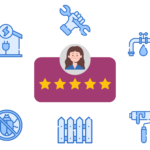RealWork Labs Celebrates
Hispanic Heritage Month
Hispanic Heritage Month is a pivotal time to acknowledge and celebrate the contributions of Hispanic individuals across various sectors, including the tech industry. Historically, the tech realm has been under-representative of the rich diversity within the Hispanic community, with many facing unique challenges on their path to success. While the tech industry hasn’t always reflected the diversity of the Hispanic community, there’s a notable shift as more Hispanic professionals step into these roles.
At RealWork Labs, we value diversity and inclusivity, believing they drive innovation and strength. Our commitment to creating an inclusive environment extends beyond words. In line with Hispanic Heritage Month, we’re highlighting the experiences of two Hispanic members of our team. They shared insights about navigating the tech industry, overcoming challenges, and advice for fellow Hispanic professionals in the field.

Shawonn Smith
Customer Success Specialist
How does Hispanic Heritage Month resonate with you, and could you share a bit about your Hispanic background?
“Hispanic Heritage Month always makes me reflect. I was born in the U.S., but my mix of Afro-Latino heritage comes from my mom’s side in Panama and my dad’s African-American background. Because of this, the month reminds me of family in Panama I don’t catch up with as often as those closer to me in New York. It’s like a tap on the shoulder, telling me to stay connected, especially with the distance. My mom grew up in Panama, and I’ve got lots of family there. I try to visit them, usually around Christmas.”
What actions or initiatives do you believe companies can take to more authentically honor Hispanic Heritage Month?
“It’s challenging, especially in Texas, where simply identifying as Hispanic can be perceived as a political statement. Often, when I mention I’m Hispanic, the immediate assumption is, “Oh, so you’re Mexican.” But it’s not that straightforward.
In Texas, the Hispanic experience is closely tied to the Mexican one, given that’s the majority here. So, recognizing and supporting Mexican heritage is essential for many. Personally, I’d love to see more outreach in immigration programs. Many immigrants coming through Mexico aren’t actually Mexican; they come from Panama, Guatemala, and other places. Assisting with immigration, perhaps even offering support or shelter to families as they settle, could make a difference. But many shy away from these opportunities, fearing the political complexities that arise whenever Hispanic issues are discussed.”
Do you believe the celebration of Hispanic Heritage Month helps in combating stereotypes or misconceptions? What are your thoughts on the month as a whole too?
“Wow, that’s a tough question, but I appreciate you posing it. It’s more like a thought experiment for me.
On the one hand, designating months like these, similar to Black History Month, is commendable. When we think about the broader American public, maybe only two out of every ten people might genuinely want to delve deeper into the culture and heritage. Still, that’s two individuals whose horizons are broadened, who can then perhaps enlighten two more, and so forth. The ripple effect is the hope.
However, there’s a line we shouldn’t cross. We don’t want Hispanic Heritage Month to be reduced to just marking specific stereotypical events, like Mexican independence, for instance. There’s a danger of it becoming superficial. Celebrating it stereotypically can be even more harmful than not acknowledging it at all.
Growing up, I remember not being entirely aware of the nuances. I would proudly say, “I’m Panamanian,” expecting understanding. But as I got older, I frequently heard, “Oh, so your mom’s Mexican?” It wasn’t right. People often don’t give much thought to these distinctions. For many, ‘Hispanic’ gets oversimplified, often equated to just being ‘Mexican’.”
How did you first become interested in the tech industry?
“For me, I’ve always been the tech whiz in the family. Even during my extended stays in Panama during my youth, I was often the go-to for technical matters. Whether it was setting up the internet or assisting my grandma with online tasks, I was the point person. I even helped my grandma and aunt obtain their passports because they were unfamiliar with the process. Having the advantage of learning about technology in America and then sharing that knowledge in Panama allowed me to elevate the technological awareness of my family there.”
Have you faced any challenges in your career because of your background and how did you navigate them?
“I wouldn’t say my heritage has given me a particular advantage or disadvantage. When it comes to appearance, many people immediately assume I’m just black, often overlooking the existence of dark-skinned Latinos.
Some people even express surprise when I identify as Hispanic, saying like, ‘Really? You’re Hispanic?’ Regardless, I’ve made connections and friendships that might not have been possible without a shared history or customs. For example, there are people in this office with whom I can talk about childhood moments, like dodging the “chancla” when we got into trouble or enjoying specific dishes, like plantain sweet tarts, which was one of my favorites. When others hear about these treats, they might say, ‘gross.’ But they don’t know what they’re missing. Especially when it comes to food, which plays a significant role in our culture. So, while from a purely professional perspective, my heritage might not be a big factor, on a personal and interpersonal level, it has enriched my life a lot.”
how has the tech industry's approach to diversity and inclusion evolved since you began your career?
“Oh my God. I mean, just look at the room, right? This is amazing. When I first started my career, this is 10, 15 years ago, it was very noticeably just white men. It starts off over time, starts to become more diverse, and starts to appreciate the viewpoints that people will have. And it’s really nice because there’s so much quality and talent from family, just my family alone that we have that never gets a chance to see the light of day because they don’t have a perfect English accent or they can express themselves. And people don’t realize that just because English isn’t your first language, it doesn’t immediately make you dumb, right? No. There’s so much knowledge that’s just hidden behind a language barrier, and if you don’t take the time to allow somebody to express that knowledge, you’re just going to immediately write ’em off as, oh, they can’t even speak English. What could they offer?”
What measures do you believe companies should adopt to better support Hispanic professionals?
“It’s crucial to invest in communities and outreach programs. Offering support for English as a second language to bridge gaps and technology might be a tool to enhance both language and knowledge. Assisting immigrants, especially those who arrive as children, is essential. They might be here to escape challenging situations or seek new beginnings. It’s vital to help them understand that while their background might differ from kids born and raised in the US, this difference can be an asset. They may identify problems that others overlook. True diversity isn’t just about having multiple races. It’s about incorporating individuals with vastly different backgrounds and experiences, ensuring a variety of perspectives.”
Do you have any advice for young Hispanic individuals or Afro-Latino individuals aspiring to build a career in tech?
“Look, having confidence is everything. I know some folks roll their eyes at the ‘fake it till you make it’ idea, but it’s really about trusting yourself. Even if you’re scratching your head at first, trust that you’ve got what it takes to figure things out. Don’t get discouraged if you don’t get something straight away. Sometimes, taking a bit longer means you get it even better than those quick learners. This goes for anything: picking up a new language, diving into coding, you name it. If you’re bilingual? You’re already a step ahead. Just keep believing in yourself. There’ll always be folks ready to doubt you. Just use that as motivation and keep pushing.”
How do you believe the increased representation of Hispanic professionals will shape the future of tech?
“It will be huge because so many of us are all over it. We don’t have to be defaulted to, “Oh, we don’t even want them to just do specific types of jobs that revolve around food or manual labor.” We have a huge population across the board, all the different nationalities, whether it’s music, whether it’s cooking, whether it’s dancing, whether it’s scientists, doctors. We have so much skill and so much talent that I don’t feel like we’re leveraging enough yet, and we need more people to reach back and lower the ladder for everybody else, get to the top, work your ass off, and then help the person behind you so they don’t have to go through those struggles. They could go through the struggles on the next rung and keep building that ladder. So it’s about helping that generational knowledge and keeping that information and that stuff together and growing together.”
Is that something you see for yourself or other individuals of your position, making sure to bolster up your community?
“Absolutely. I owe a lot to my mom. She joined the Marines and moved to America when she was just 18. As an immigrant, and presenting as black in the Marines back in the day, she faced her own set of challenges. She brought with her a wealth of skills and knowledge that shaped my life. My experiences were different from hers, but I’ve learned so much from her journey. I’m determined to take what I’ve learned, and what she’s passed on to me, to give my kids an even better life. That’s how we keep growing and pass on that generational knowledge and wealth.”
Do you have anything else you would like to share?
“Thank you for doing this. It is very nice to get this information and this knowledge out there. I think it’s going to be something that I hope continues to expand and then grow.”

Sergio De La Garza
IT Supoort Specialist
What actions or initiatives do you believe companies can take to authentically honor Hispanic Heritage Month?
“Nothing. Nothing. I don’t even care about that. No. I guess just being respectful when you speak your native tongue around others. If someone speaks Spanish and is next to me, and I start talking in Spanish, I would continue the conversation in English out of respect for those around us. But also, others should just respect the language. Don’t get super freaked out when people speak another language around you. People are always like, “What are they saying about me?” but that’s not likely the case.”
Can you give me some of your background and what you think of Hispanic Heritage Month as a whole?
“Right from the start, I want to be clear: I don’t understand the idea of Hispanic Heritage Month. The idea of dedicating an entire month feels condescending to me. That said, let’s get into my background. Born in Laredo, Texas, I spent the initial 13 years of my life just across the border in Mexico – that’s where my family is from. They wished for me, as a male, to be American, hoping it would give me a better future.
Growing up, Spanish was my first language. I attended a private Catholic school, where I learned both Spanish and English. Half of my subjects, like the sciences, were taught in English, while others, such as math and reading, were in Spanish. Transitioning to the US in eighth grade was challenging, especially in Laredo. Although I was proficient in written English and Spanish (even topping my English class, which was ironic since I struggled with spoken English), talking was a different battle. That’s mainly because I’m just quiet. But I noticed friends who had moved to the US before me were more fluent, and that added another layer of complexity.
High school was a continuation of my previous experiences. Through all this, I’ve held huge pride in my heritage and language. It’s a tool you borrow, not own. If you grasp a language, you can better frame your emotions and thoughts, discovering parts of yourself.
I’ve always had this hesitation about speaking out, especially in class. And, if you ask me about identity, I resonate more with being a Texan than an American. While labels like Mexican-American or Hispanic-American are thrown around, I don’t resonate with them. But what I do resonate with is my cultural heritage and the importance of language. Being connected to your roots and understanding language is important.”
How has your background influenced your professional journey?
“Damn, that’s a tough one. How has my cultural background impacted me? Well, I think it’s played a significant role in shaping my communication style. In college, I wasn’t really outspoken. That reluctance to speak up, which I felt in my younger years, followed me a bit into my college days. That’s probably the most direct way my background affected my career.
But when it comes to tech, well, technology is universal. If you learn to code in a particular language and then go to China, it’s the same language. Everything in tech, from the oldest tools to the newest programming languages and frameworks, is primarily in English for simplicity’s sake. So, once you learn it, that’s it. There isn’t a different syntax for Spanish, English, or any other language. You just learn what’s necessary and move forward.”
How has the tech industry's approach to diversity and inclusion evolved since you began your career?
“Well, technology is generally the most diverse out of all the positions. Many talented coders, programmers, and cybersecurity people were from South America. So, for me, that doesn’t exist in technology.”
What about tech companies?
“Well, I can only speak to my experience; it has always been not that bad or anything. My first role in my field was working in a team with all white people. But I’m only saying this because you’re asking me. Honestly, I don’t even notice it myself. But yeah, that’s just in my experience, at least in Austin.
If you go to San Antonio, it’s a completely different scene. I’ve always said, “You don’t need to speak English to be successful in Texas,” but you do need to speak English here in Austin. I’ve realized that in San Antonio and Laredo, you can go by speaking in Spanish. In Laredo, my dad doesn’t know any English, and he’s able to own a business.”
Do you have anything else you would like to share?
“Embrace the diversity around you, especially in your workplace.
One thing I love about soccer – or football, as it should be called – is its global reach. Growing up, I collected stamp albums featuring different players, and it was cool recognizing the origins of their last names. I’d think, ‘Oh, that’s a Russian last name, or that’s Ukrainian, or Spanish.’
This recognition has been super useful in my life. It’s a great icebreaker when I can point out, ‘Hey, your last name sounds Italian!’ or something like that. Just asking someone about their origins and trying to understand it – it’s such a simple way to connect.”
Resources for Hispanics for tech:
Hispanic IT Executive Council (HITEC) – HITEC is a premier global executive leadership organization of senior business and IT executives. They work towards expanding the representation of Hispanics at executive levels in technology companies.
Latinas in Tech – This is a non-profit organization aiming to connect, support, and empower Latina women working in tech. They offer mentorship, networking events, and professional development opportunities.
Techqueria – Techqueria is one of the largest communities of Latinx professionals in the tech industry. They offer events, job opportunities, and a vibrant community for networking.
CODE2040 – CODE2040 is committed to ensuring the representation of Black and Latinx individuals in the innovation economy. They provide students with internships, mentorship, and leadership training.
SHPE (Society of Hispanic Professional Engineers) – SHPE provides Hispanic engineers, scientists, and students with opportunities for professional and academic development.






